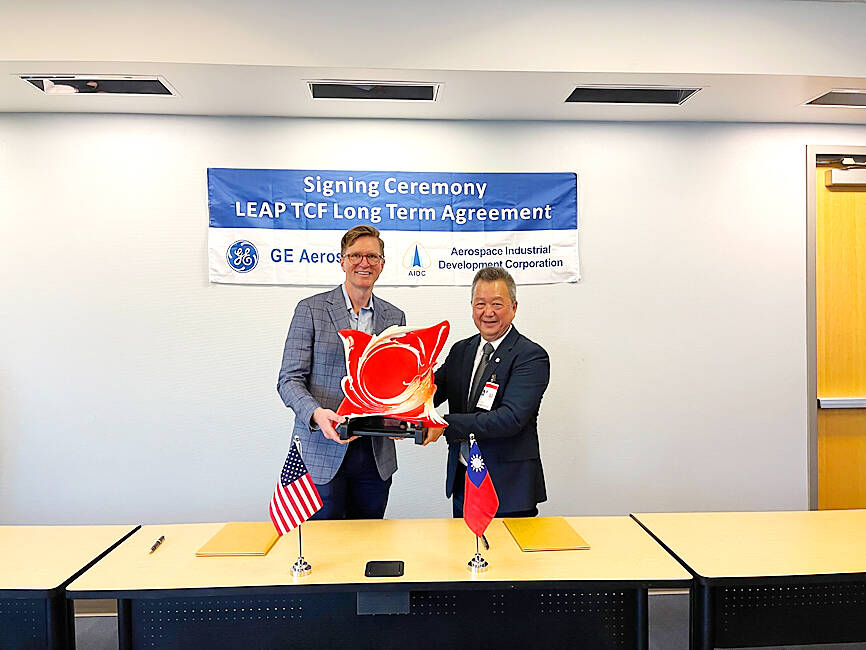Aerospace Industrial Development Corp (AIDC, 漢翔航空) shares yesterday soared 10 percent, the maximum daily increase allowed on the Taiwan Stock Exchange, after the company on Tuesday announced that it had secured orders of more than NT$35 billion (US$1.15 billion) to provide engine components to GE Aerospace Inc.
The 10-year contract with US-based GE Aerospace was the Taiwanese company’s first long-term order after the recovery of air transportation in the wake of the COVID-19 pandemic, AIDC said in a statement.
AIDC, a maker of military and civil aviation products, would manufacture central structural components for GE Aerospace’s LEAP turbine engines, the company said.

Photo courtesy of Aerospace Industrial Development Corp via CNA
LEAP engines power Airbus SE’s A320neo and Boeing Co’s 737 MAX aircrafts.
AIDC in 2018 signed contracts with GE Aerospace to manufacture 17 LEAP engine components.
The new contract is to take effect in 2026 and run until 2035, the company said, adding that it expects the deal to help generate steady, significant revenue.
Prices under the contract are adjustable to take into account inflation and the results of follow-up negotiations, it said.
AIDC said the aerospace industry’s outlook is rosy, adding that the GE deal would ensure that its factories operate at full capacity.
Despite the COVID-19 slump, it maintained its facilities and trained employees throughout the pandemic, it added.
AIDC’s cumulative revenue rose 72 percent annually to NT$9.94 billion for the first three months of this year, company data showed.
Global passenger numbers last year recovered to about 68.5 percent of pre-pandemic levels, the company said, citing International Air Transport Association data.
Boeing has forecast that airlines would need 41,170 new aircraft from last year to 2041, while Airbus forecast that 39,490 new planes would be needed, it said.
AIDC said it previously manufactured front compressor cases for LEAP engines, as well as middle compressor cases, combustion chamber diffuser cases, engine hot sections and engine central structural components.
Led by AIDC chairman Hu Kai-hung (胡開宏), the company signed the deal at GE Aerospace’s headquarters in Cincinnati, Ohio, on Tuesday.

Semiconductor business between Taiwan and the US is a “win-win” model for both sides given the high level of complementarity, the government said yesterday responding to tariff threats from US President Donald Trump. Home to the world’s largest contract chipmaker, Taiwan Semiconductor Manufacturing Co (TSMC, 台積電), Taiwan is a key link in the global technology supply chain for companies such as Apple Inc and Nvidia Corp. Trump said on Monday he plans to impose tariffs on imported chips, pharmaceuticals and steel in an effort to get the producers to make them in the US. “Taiwan and the US semiconductor and other technology industries

SMALL AND EFFICIENT: The Chinese AI app’s initial success has spurred worries in the US that its tech giants’ massive AI spending needs re-evaluation, a market strategist said Chinese artificial intelligence (AI) start-up DeepSeek’s (深度求索) eponymous AI assistant rocketed to the top of Apple Inc’s iPhone download charts, stirring doubts in Silicon Valley about the strength of the US’ technological dominance. The app’s underlying AI model is widely seen as competitive with OpenAI and Meta Platforms Inc’s latest. Its claim that it cost much less to train and develop triggered share moves across Asia’s supply chain. Chinese tech firms linked to DeepSeek, such as Iflytek Co (科大訊飛), surged yesterday, while chipmaking tool makers like Advantest Corp slumped on the potential threat to demand for Nvidia Corp’s AI accelerators. US stock

The US Federal Reserve is expected to announce a pause in rate cuts on Wednesday, as policymakers look to continue tackling inflation under close and vocal scrutiny from US President Donald Trump. The Fed cut its key lending rate by a full percentage point in the final four months of last year and indicated it would move more cautiously going forward amid an uptick in inflation away from its long-term target of 2 percent. “I think they will do nothing, and I think they should do nothing,” Federal Reserve Bank of St Louis former president Jim Bullard said. “I think the

‘LASER-FOCUSED’: Trump pledged tariffs on specific sectors, including semiconductors, pharmaceuticals, steel, copper and aluminum, and perhaps even cars US President Donald Trump said he wants to enact across-the-board tariffs that are “much bigger” than 2.5 percent, the latest in a string of signals that he is preparing widespread levies to reshape US supply chains. “I have it in my mind what it’s going to be but I won’t be setting it yet, but it’ll be enough to protect our country,” Trump told reporters on Monday night. Asked about a report that incoming US Secretary of the Treasury Scott Bessent favored starting with a global rate of 2.5 percent, Trump said he did not think Bessent supported that and would not